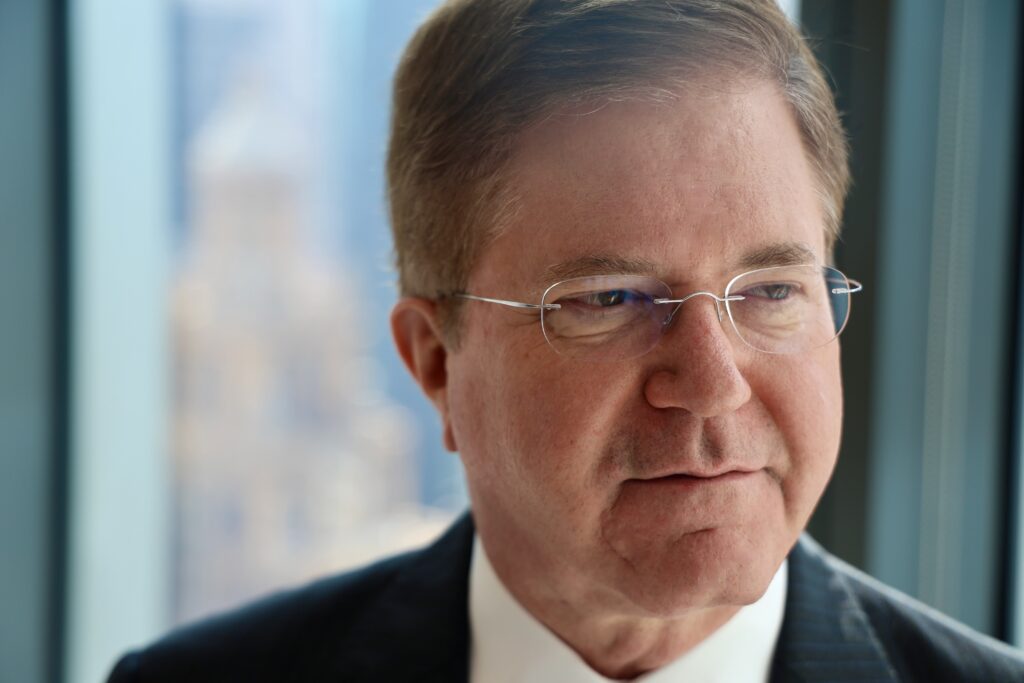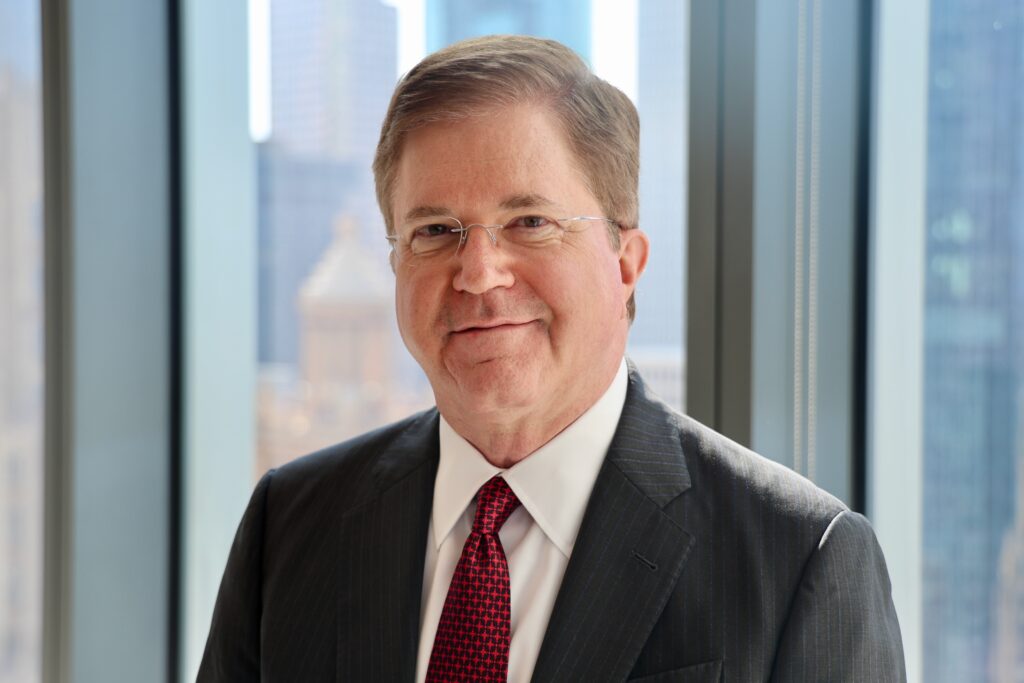White & Case partner Sean Gorman grew up in the small town of Wharton, Texas, which has a population of less than 9,000.
One day, when he was in middle school and visiting Houston, he pointed to a skyscraper under construction and said he would work there one day.
And one day, after graduating from the University of Houston Law Center in 1988, he did. He joined Butler & Binion, located in that same building. It is also where he met his wife.
Gorman later practiced at Bracewell for nearly eight years before moving to White & Case in January 2023 with two other Bracewell partners and three associates.
“No one wins cases alone; our teams are why we win,” Gorman said.
Gorman recently sat down with The Texas Lawbook to discuss his career and more.
The following conversation has been edited for length and clarity.
Texas Lawbook: What has been a memorable experience or case in your career?
Gorman: Well, there’s no question that our team’s victory at trial in the BMC Software v. IBM case is memorable. It was a bench trial to [Judge] Gray Miller, a very highly respected judge. IBM hired some of the best lawyers in the world, Quinn Emanuel and Paul Yetter. It was a difficult case. We won $1.6 billion. We were able to obtain judgment protection insurance for the full amount of actual damages plus prejudgment interest.
The Fifth Circuit took a different view to Judge Miller’s conclusions, but the experience in trial, our team’s execution, was flawless. We knew what to expect. We were ready. We were calm and focused and lethal, and it was also a joy to deal with Paul Yetter. He is an exceptional trial lawyer, an honorable opponent and a kind person. I have enormous respect for Paul. It’s a once-in-a-career experience to have a substantive, difficult, challenging case, to have exceptional opponents, to have a court that respects the litigants, that listens, that is thoughtful. Judge Miller’s findings of fact and conclusions of law were extensive and, I think, very well thought out. So that, of course, will be something that I will always remember.

Lawbook: Do you have a post-trial celebration?
Gorman: I take the team and the client to a big dinner. Food is a theme in my life. I love food and wine, and so my favorite post-trial places to go are DeMarco, which is an Italian restaurant in Houston, and El Tiempo. Depending on the trial, we might have multiple trial conclusion dinners. You can’t celebrate enough, even if the outcome isn’t what you expect, it’s still, I think, important to be together and to remember what we did well. In the office, we can talk about lessons learned and create the after-action report. But I think it’s always important for the team and for the in-house lawyers to be together and to break bread together after a trial, whatever the outcome.
Lawbook: Why did you choose to follow a career in law?
Gorman: I’m the first lawyer in my family. I grew up in Wharton, and so I saw the lawyers in town, but I didn’t really know what they did. And when I was a senior in college, I was thinking about what I would like to do. And I would kind of walk around campus, and I went over to the law school once. … [I]t was busy and active, and people were talking there — all these people sitting around talking to each other. And I liked that. And I thought, now law is the mediator of our shared human experience in the middle of society. Every lawyer touches everything. Everything goes through lawyers of one sort or another. And so I thought, I think I’d like to do this.

And so I applied to one law school, and it’s turned out great. I didn’t know that lawyers like me existed, but you get involved in the process. The bus is going somewhere, and you’re on it. And before I knew it, I was at one of the great Houston law firms, Butler & Binion, that is now gone, and that started my career. I always wanted to do litigation, because I like understanding people, I like talking to people, I like persuading people.
Now I have these amazing cases. I have a case involving an offshore natural gas field near Africa. I have cases related to the Celsius cryptocurrency exchange fallout. I have cases involving LNG. I have cases involving a large-diameter transmission pipe. I grew up in Wharton, Texas. I didn’t know these things existed. I didn’t know lawyers were like this. We’d come to Houston and I’d see these big buildings. There was one that was under construction when I was a kid, and I thought, I want to work there someday, and I didn’t know how to get there. And sure enough, that, coincidentally, was where Butler & Binion’s offices were. I went to the interviews, I thought, “Oh my goodness, this is the building that was under construction when I was a kid.” And here I am.
Lawbook: What is a hobby of yours when you get a chance to step away from your desk or the courtroom?
Gorman: For my career, have primarily done two things: I’ve worked really, really hard, and I’ve tried to be a good husband and father. And so when I’m not working, I’m spending time with our four daughters, the oldest of whom is about to start at Vinson and Elkins — not as a litigator, as a tax lawyer, like her mother. And although I will say we did not encourage or discourage her from the law, I love what I do, and I think she saw that. But with our children, where they go to college, what they do, it’s up to them. And she decided on the path and has just loved it. We have twin daughters who are doing Teach for America in Hawaii, and we have an 11th grader at St. Agnes. So it’s not a hobby, it’s my vocation. So really, I have two vocations that take up all of my time. I am a commercial disputes courtroom lawyer, and I am a father and husband.
Lawbook: Do you have a favorite fictional lawyer?
Gorman: It has to be the lawyer from To Kill a Mockingbird, Atticus Finch.
In commercial litigation, we don’t get to do things like that, but I do think that we play a very important role — we protect companies. Companies provide jobs for people. What we do doesn’t directly affect individual human beings, but it does because it protects the companies for which they work, and it enables the economy to move forward. If every person and every company resorted to self-help, nothing would work. This great quality of life that we all have is made possible by a variety of things, and one of those things is the rule of law. And just like it’s important that individuals are protected by the rule of law, it’s also important that groups of individuals, that companies and institutions are protected by the rule of law from the government, from each other, and so that’s why I think that what we do as commercial litigators is important.

Lawbook: I saw you were appointed to the Texas Ethics Commission. What have you learned in the year you’ve been a part of the commission?
Gorman: It goes back to when I was about … a third-year lawyer. I was thinking one night that, pretty soon in the world, people are going to realize that they shouldn’t breach their contracts, they shouldn’t discriminate against people. That all the things that keep lawyers busy, it’s like — well, I mean, this is pretty obvious stuff — you shouldn’t do this. Then what am I going to have to do? But you know what I have learned over the past 37 years is that the human situation is remarkably resilient to our higher natures, and people keep doing things that they know they shouldn’t. Now, in commercial disputes, breaching contracts is a little bit different. There actually could be good reasons. In any event, what I’ve learned from the Texas Ethics Commission is that people do shockingly silly stuff. Elected officials spend campaign money on trips with their family. People don’t file proper reporting of campaign contributions and expenditures. These are not complicated or difficult things not to do or to do. If you’re going to be an elected official, you need to do these things. There is a consistent parade of people in front of us who don’t.
If you or someone you know would like to be profiled in a future edition of Asked & Answered, please let us know at tlblitigation@texaslawbook.net. Check out our other Asked & Answered interviews below:
Dykema member Melanie Fry told The Lawbook how her father’s choice to pursue and earn a law degree when she was a young child positively impacted the family and influenced her own career path. “Watching the power of an education — that’s what drew me into the law,” she said.
Jackson Walker partner Juan Alcala discussed representing Chevron and arguing before the Fifth Circuit Court of Appeals. Alcala recently joined Jackson Walker from Holland & Knight.
Gibson Dunn & Crutcher partner Trey Cox talked about some of his recent big verdicts and an upcoming trial. With another trial on his calendar in October, Cox told The Texas Lawbook he plans to keep the momentum going.
Vinson & Elkins partner Quentin Smith discussed securing an $80 million breach of contract verdict for Huntsman Chemicals in Louisiana and representing Oncor Electric in litigation stemming from Winter Storm Uri. Smith began his career with Vinson & Elkins 21 years ago as an intern in the firm’s high school program.
